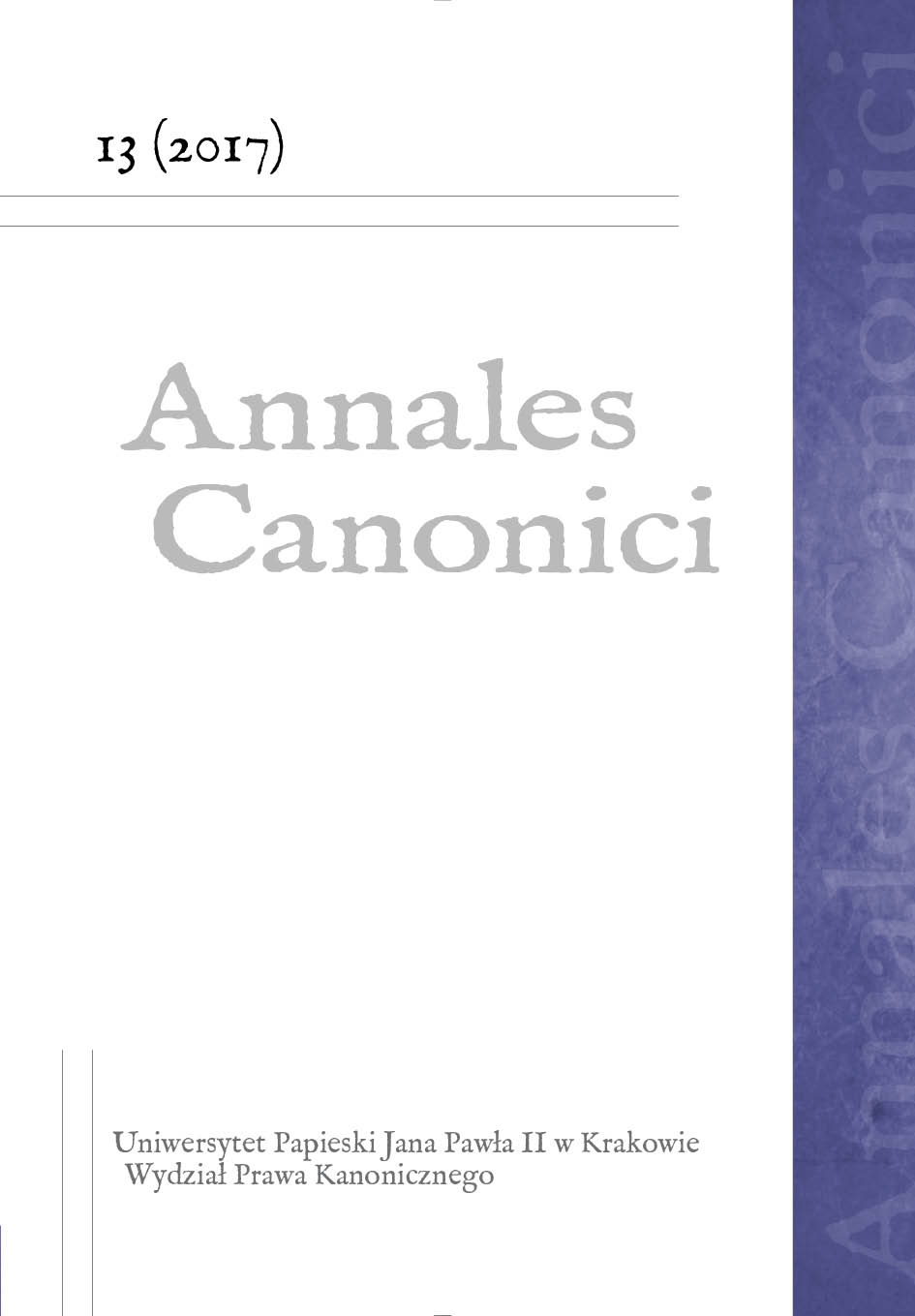Rady, które wspierają biskupa diecezjalnego
DOI:
https://doi.org/10.15633/acan.2220Słowa kluczowe:
Kościół partykularny, diecezja, biskup diecezjalny, pomocnicze organy kolegialne, rady diecezjalne, rady „pozakanoniczne”, posługa duszpasterska, zarządzanie diecezjąAbstrakt
Jeśli chodzi o wewnętrzną organizację Kościołów partykularnych, aktualny KPK wymienia kilka organów kolegialnych, które pomagają w zarządzaniu diecezją (kan. 460–514). Celem niniejszego opracowania nie jest analiza wszystkich pomocniczych organów kolegialnych podanych przez kodeks, ale jedynie tych, które są radami – radami wspierającymi biskupa diecezjalnego. Należą do nich: rada do spraw ekonomicznych, rada biskupia, rada kapłańska, rada misji i kolegium konsultorów, rada duszpasterska – wszystkie wspomagają biskupa przede wszystkim w posłudze duszpasterskiej, a także w zarządzaniu dobrami duchowymi i doczesnymi diecezji. Biskup diecezjalny obok tych „kanonicznych” rad może również ustanowić w swojej diecezji inne, których nie ma w kodeksie, na przykład: radę dziekańską, radę zakonną, radę do spraw młodzieży, radę katechetyczną itp. Wszystkie one są organami doradczymi biskupa. Ich propozycje, porady czy opinie powinny wspierać biskupa diecezjalnego i pomagać mu w prawidłowym zarządzaniu jego diecezją.Bibliografia
Źródła
Codex Iuris Canonici auctoritate Ioannis Pauli PP. II promulgatus, 25.01.1983, „Acta Apostolicae Sedis” 75 (1983), pars II, s. 1–317; tekst polski w: Kodeks prawa kanonicznego, przekład polski zatwierdzony przez Konferencję Episkopatu, Poznań 1984.
Congregazione per i Vescovi, Direttorio per il ministero pastorale dei vescovi – 22.02.1973, w: Enchiridion Vaticanum. Documenti ufficiali della Santa Sede 1971–1973, a cura di E. Lora, vol. 4, Bologna 1985, s. 1226–1487.
Giovanni Paolo II, Costituzione apostolica Ecclesia in urbe, 1.01.1998, http://w2.vatican.va/content/john-paul-ii/it/apost_constitutions/documents/hf_jp-ii_apc_01011998_ecclesia-in-urbe.html (13.06.2017).
Paolo VI, Costituzione apostolica Vicariae potestatis in urbe, 6.01.1977, http://w2.vatican.va/content/paul-vi/it/apost_constitutions/documents/hf_p-vi_apc_19770106_vicariae-potestatis.html (13.06.2017).
Sobór Watykański II, Dekret o pasterskich zadaniach biskupów w Kościele Christus Dominus, w: Sobór Watykański II, Konstytucje, dekrety, deklaracje, Poznań 2002, s. 377–404.
Sobór Watykański II, Dekret o posłudze i życiu kapłanów Presbyterorum ordinis, w: Sobór Watykański II, Konstytucje, dekrety, deklaracje, Poznań 2002, s. 478–510.
Życiński J., Dekret promulgujący Statut księży dziekanów Archidiecezji Lubelskiej, N. 1083/Gł/2000, 2.12.2000, http://diecezja.lublin.pl/prawo/statut_dziekanow.htm (13.06.2017).
Literatura
Chiappetta L., Il Codice di Diritto Canonico. Commento giuridico-pastorale, t. 1, Roma 1987.
Chiappetta L., Prontuario di Diritto Canonico e Concordatario, Roma 1994.
Gambari E., Vita religiosa secondo il Concilio e il nuovo Diritto Canonico, Roma 1984.
Góralski W., Pozycja prawna osób świeckich w Kościele według nowego Kodeksu Prawa Kanonicznego, „Prawo Kanoniczne” 28 (1985) nr 1–2, s. 49–60.
Góralski W., Struktury synodalne i kolegialne w Kościele partykularnym według KPK Jana Pawła II, „Studia Płockie” 14 (1986), s. 54–68.
Kasprzak S., Posługa misyjna Kościoła partykularnego według Kodeksu Prawa Kanonicznego z 1983 roku, „Roczniki Nauk Prawnych” 11 (2001) z. 2, s. 19–64.
Krukowski J., Kapituły kanoników, w: Komentarz do Kodeksu Prawa Kanonicznego. Lud Boży, red. J. Dyduch, W. Góralski i in., t. 2/1, Poznań 2005, s. 395–403.
Krukowski J., Kuria diecezjalna, w: Komentarz do Kodeksu Prawa Kanonicznego. Lud Boży, red. J. Dyduch, W. Góralski i in., t. 2/1, Poznań 2005, s. 344–381.
Sitarz M., Competences of Collegial Organs in a Particular Church in the Exercise of Executive Power According to the Code of Canon Law of 1983, Lublin 2013.
Sitarz M., Rada duszpasterska, w: Komentarz do Kodeksu Prawa Kanonicznego. Lud Boży, red. J. Dyduch, W. Góralski i in., t. 2/1, Poznań 2005, s. 404–409.
Sitarz M., Rada kapłańska i kolegium konsultorów, w: Komentarz do Kodeksu Prawa Kanonicznego. Lud Boży, red. J. Dyduch, W. Góralski i in., t. 2/1, Poznań 2005, s. 381–395.
Sitarz M., Synod diecezjalny, w: Komentarz do Kodeksu Prawa Kanonicznego. Lud Boży, red. J. Dyduch, W. Góralski i in., t. 2/1, Poznań 2005, s. 333–334.
Sztafrowski E., Podręcznik prawa kanonicznego, Warszawa 1985.
Wroceński J., Diecezjalna Rada Duszpasterska w nowym Kodeksie Prawa Kanonicznego, „Prawo Kanoniczne” 34 (1991) nr 3–4, s. 105–113.
Wroceński J., Udział wiernych świeckich w wykonywaniu władzy rządzenia w Kościele partykularnym, „Kieleckie Studia Teologiczne” 8 (2009), s. 215–230.
Pobrania
Opublikowane
Numer
Dział
Licencja
Prawa autorskie (c) 2017 Stanisław Iwańczak

Utwór dostępny jest na licencji Creative Commons Uznanie autorstwa 4.0 Międzynarodowe.
Autorzy publikujący w czasopiśmie udzielają jego wydawcy zgody o następującej treści:
- Autor zachowuje autorskie prawa majątkowe do utworu, a jednocześnie udziela wydawcy czasopisma zgody na jego pierwszą publikację w wersji drukowanej i wersji online na licencji Creative Commons Uznanie autorstwa 4.0 Międzynarodowe oraz zgody na wykonywanie opracowań, w tym przekładów.
- Autor ma możliwość udzielania zgody niewyłącznej na opublikowanie utworu w wersji, która ukazała się w czasopiśmie (np. zamieszczenia go w repozytorium instytucjonalnym lub opublikowania w książce), wraz z informacją o jego pierwszej publikacji w czasopiśmie.
- Autor może umieścić swój utwór online (np. w repozytorium instytucjonalnym lub na swojej stronie internetowej) jeszcze przed zgłoszeniem utworu do czasopisma.

